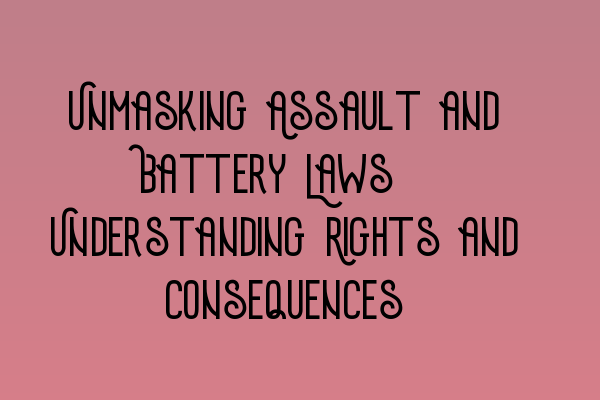Unmasking Assault and Battery Laws: Understanding Rights and Consequences
Assault and battery are often confused or used interchangeably in everyday conversation, but legally speaking, they have distinct meanings and carry different consequences. If you find yourself facing charges related to assault or battery, it is crucial to understand your rights and the potential repercussions. In this article, we will delve into the definitions of assault and battery, discuss their legal implications, and highlight the importance of seeking professional legal assistance.
Assault
Assault is the intentional act of creating apprehension or fear of harmful or offensive contact in another person. It does not require any physical contact to occur. Instead, assault focuses on the subjective state of the victim and the defendant’s intention to create fear or harm. An example of assault would be someone raising a fist as if to strike another person, causing fear in the potential victim.
Several factors need to be present for an act to constitute assault. Firstly, the defendant must have the intent to create apprehension or fear in the victim. Secondly, the victim must reasonably believe that harmful or offensive contact is imminent or the defendant has the present ability to carry out the threat. It is important to note that assault can occur even if no physical contact eventually takes place.
It is crucial to consult with a qualified criminal defense lawyer if you are facing assault charges. They can assess the specific circumstances of your case and guide you through the legal process to ensure your rights are protected. For more information on legal exam preparation, check out the SQE 1 Practice Exam Questions.
Battery
Battery, on the other hand, involves the intentional, unwanted, and harmful or offensive physical contact with another person. Unlike assault, battery requires actual physical contact to occur. It involves touching or striking someone without their consent or against their will. Examples of battery include hitting, punching, or unwanted sexual touching.
In a battery case, the key elements are intent and physical contact. The defendant must intend to cause the harmful or offensive contact, and the contact must actually occur. Even if the defendant did not intend to cause harm but their actions resulted in harmful or offensive contact, they may still be held liable for battery.
If you are facing battery charges, it is essential to seek legal representation immediately. A proficient criminal defense attorney can analyze the evidence against you, challenge any procedural errors, and work towards obtaining the best possible outcome for your case. To prepare for the SQE 1 exam, be sure to practice with the SQE 1 Practice Mocks FLK1 FLK2.
Legal Implications and Consequences
Both assault and battery are considered criminal offenses in the UK legal system and carry significant legal consequences. The severity of the charges and potential penalties depend on various factors, such as the nature of the offense, the extent of harm caused, the presence of aggravating factors, and the defendant’s criminal history.
Assault charges can range from common assault, which is often dealt with in the Magistrates’ Court, to more serious offenses such as grievous bodily harm (GBH) or actual bodily harm (ABH). The potential penalties for assault can include fines, community orders, restraining orders, and even imprisonment.
Battery charges can also lead to severe penalties, especially in cases involving significant physical harm or the use of weapons. Penalties for battery may include imprisonment, fines, compensation orders, and probationary periods. The exact consequences will depend on the specific circumstances of the case.
Considering the serious legal implications of assault and battery charges, it is crucial to hire an experienced criminal defense solicitor who specializes in criminal law. They will work diligently to build a strong defense strategy, challenge the prosecution’s evidence, and protect your rights throughout the legal process. If you are looking for SQE 2 preparation courses, you can find valuable resources at SQE 2 Preparation Courses.
To conclude, understanding the legal distinctions between assault and battery is essential for anyone facing charges related to these offenses. It is important to seek professional legal assistance to navigate the complexities of the criminal justice system and ensure the best possible outcome for your case. Remember, the key to a successful defense lies in the expertise of your criminal defense solicitor. Keep up to date with important SRA SQE exam dates by visiting SRA SQE Exam Dates.
